Obama Handing Out Ambassadorships To Top Donors And Friends, Just Like His Predecessors
President Obama has appointed a lot of donor's and supporters to plumb Ambassadorial slots. That's not at all unusual.
President Obama has given out a lot of plumb Ambassadorial slots to top campaign donors, supporters and bundlers, but that’s just a continuation of a practice that’s been going on in Washington for a long time:
President Obama has rewarded at least 19 campaign contributors and political allies with ambassadorships this year, according to an analysis by The Hill.
Nominations to plum postings have gone to no fewer than eight bundlers, six of whom raised more than $1 million for the president’s reelection campaign. The president has also given prized ambassadorships to key fundraising staffers, including the head of his 2012 finance operation.
(…)
Internal financial documents obtained by The New York Times suggest the price per post is also at an all-time high, although apples-to-apples comparisons aren’t possible because precise figures aren’t available for previous administrations.
The amounts raised by the eight bundlers in 2011-2012 ranged from $2.36 million by Women for Obama Finance Chairwoman Denise Bauer to $477,000 from Los Angeles entertainment attorney and Michelle Obama Princeton classmate Crystal Nix Hines. The two women have been named to serve as ambassadors to Belgium and UNESCO, respectively, while other bundlers have been tapped for service in the United Kingdom, Germany, Spain, the Dominican Republic, Singapore and Austria.
Another bundler, Democratic National Committee National Finance Chairwoman Jane Stetson, is rumored to be in line for the top diplomatic post in Paris, perhaps the most prestigious ambassadorial position of them all. Stetson raised $2.43 million for Obama.
The Paris and London postings were also coveted by Vogue Editor-in-Chief Anna Wintour, Obama’s fourth biggest bundler, who raised $2.68 million, but she’s expected to have to settle for something else.
Retired JPMorgan Vice President Azita Raji, Obama’s second biggest bundler, at $3.15 million, is a top choice for ambassador to Switzerland.
And Caroline Kennedy, daughter of John F. Kennedy and a lifelong Democratic activist, is the heavy favorite for ambassador to Japan.
“I am proud that such experienced and committed individuals have agreed to serve the American people in these important roles,” Obama said when he named Matthew Barzun, the national finance chairman of Obama for America and a bundler who raised $2.31 million, to be ambassador to the United Kingdom of Great Britain and Northern Ireland.
Obama’s use of ambassadorships as rewards to bundlers has drawn cries of protest from career diplomats.
“Now is the time to end the spoils system and the de facto ‘three-year rental’ of ambassadorships,” the American Foreign Service Association said in a statement after Obama’s election. “The United States is alone in this practice; no other major democracy routinely appoints non-diplomats to serve as envoys to other countries.”
Retired U.S. diplomat Thomas Pickering told Britain’s The Guardian newspaper that the practice amounted to selling public office to the highest bidder after a spate of donor appointments last week.
“All these people want to go to places where the lifestyle issues [are pleasant],” Pickering said. “It has the effect of diminishing perhaps the sense that the US is treating these countries with the respect they deserve.”
Pickering arguably has a point here. Giving out Ambassadorial appointments to supporters and “Friends of the President” is a seemingly unique American practice, and one can see why host countries might be put off by a practice that basically says that the resident representative of a close ally, and the most important nation on the planet, is being decided who raised the most money for the President’s campaign. At the same time, though, its never been clear that these appointments really raise all that much ire with the host country at all. After all, the job of Ambassador in a nation such as France, Japan, or the United Kingdom hardly involves the kind of diplomatic training that a campaign donor is unlikely to have. Instead, they tend to play more of a role on the business side of the ledger, acting as an advocate for doing business in the United States and expanding trade relationships. Given that many of these top campaign donors come from the business world, it’s arguably the case that they have precisely the kind of skills necessary to perform that role. Finally, it’s worth noting that we now live in a world where it’s not really necessary for Ambassadors to act as the primary diplomatic contact between the United States and the host country. If the Secretary of State needs to talk to his counterpart in London, Berlin, Paris, or Tokyo, the technology exists today to make that happen quite easily, not just by telephone but also via video conference if necessary. When Ambassador’s are acting in a diplomatic role today, they are typically just following up on those discussion, and likely only after having been extensively briefed on what to say by people back in Washington. The days when Thomas Jefferson and John Adams had to wait weeks to hear back from the government in Philadelphia about how to proceed with respect to discussions with the Bourbon King Louis XVI or the Court of St. James.
The other thing worth pointing out is that President Obama isn’t really doing anything unusual:
Presidents of both parties have long rewarded donors with diplomatic prestige, but Obama appears to be outdoing his immediate predecessors.
As of June 28, 32.2 percent of Obama’s ambassadorial appointments had gone to political appointees, according to the American Foreign Service Association, versus 30.02 percent under George W. Bush, 27.82 percent under Bill Clinton and 31.30 percent under George H.W. Bush.
Yes 32.2% is higher than 30p.02%, 27.82%, and 31.30%, but two thoughts come to mind. First of all, the numbers for previous Presidents appear to be through their full terms in office, while Obama’s are only through his first term and first six months of his second term. Would it not be more valid to compare numbers for all four Presidents over a similar period of time? After all, the President will obviously be appointing more Ambassadors over the next 3 1/2 years and many of them will likely be career diplomats, especially those to sensitive posts and most third-world nations. At that point we’ll get a better idea of what the comparisons are. Second, notwithstanding the fact that the President does lead his four immediate predecessors in the percentage of Ambassadorial appointments going to donors and supporters, the numbers don’t really appear to me to be statistically significant. Is Obama’s 32.2% really all that different than George W. Bush’s 31.30%, or the numbers for the first President Bush and President Clinton?
I tend to agree that there is something unseemly about diplomatic posts seeming to go to the highest bidder, but this is something that has been a long-standing practice for better or for worse. Given the fact that there doesn’t seem to be any damage or offense caused by this statute, and that President Obama’s appointments don’t strike me as being all that far out of line compared to the practices of his immediate predecessors. Unless someone can point me to a real harm that’s being done to the nati0n’s foreign relations, I just don’t see the story here.
H/T: Ed Morrissey
Photo via Flick feed of Flickr user tom_arthur under a Creative Commons license
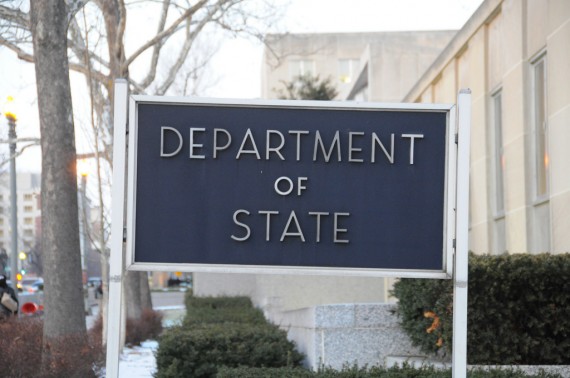

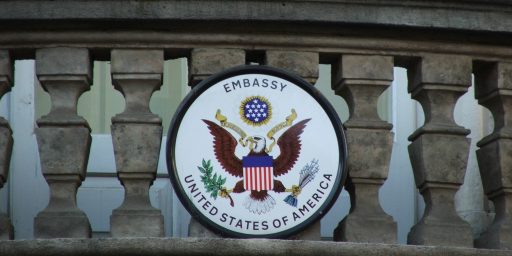
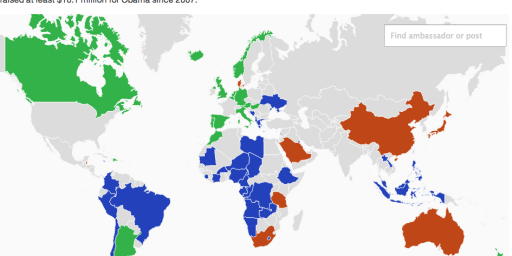
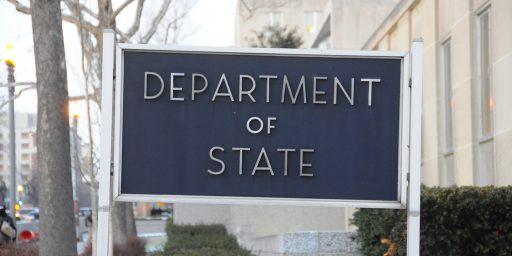
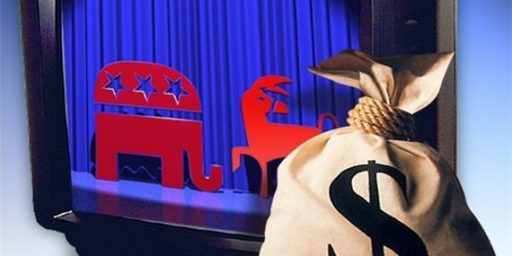

Another point in flavor of appointing high flyers is that they know how to keep a straght face and smooze at the various receptions, dinners and other social events that are the unhappy fate of diplomats in first world nations.
“Longstanding practice” is a pretty lame rationale to justify what is clearly a spoils system.
Really?
Do we have the list the things that Obama has done just like his predecessors that have now become Constitutional crisises?
Talk about nepotism and taking care of cronies…
Life is good…I was beginning to get bored.
I certainly trust you weren’t Hoping for a Change, Doug…
And I wonder what the going price is for being named Ambassador to Libya. Why risk an actual skilled, professional diplomat when you could instead sub in a useless tick?
There’s another argument for installing insiders: they’re insiders. They know the high-level people and can communicate through back channels that a career diplomat has never heard of.
Stetson studied at the Sorbonne while her father was Ambassador to France. I’m not seeing a problem with this nomination.
@Jenos Idanian #13:
Chris Stevens was a career diplomat, as is the person named to succeed him. You ought to check your facts before posting your comments.
@C. Clavin: DAMN that Liz Cheney! Who does she think she is? Caroline Kennedy? Hillary Clinton? Nancy Pelosi?
(Feel free to toss in any more prominent Democrats who’ve run for high office with zero experience and lots of nepotism. I just named the first three that came to mind.)
@Doug Mataconis: Actually, Doug, my intention was to say that it sucks that an accomplished career diplomat was our Ambassador to Libya when Benghazi happened, and we should consider not sending another valuable diplomat there — better to risk someone far less valuable.
It’s too bad Marc Rich passed away so recently…
@Jenos Idanian #13:
we should consider not sending another valuable diplomat there — better to risk someone far less valuable.
You don’t seem to be doing anything worth a damn. Nomination!
Since the founding of State Dept. in 1789, this has been the case. In the UK, there has been one — yes, one — career diplomat named as ambassador in over 200 years. All the rest, John Adams, John Quincy Adams, Martin Van Buren, and Robert Todd Lincoln included — have been political appointees. When I served at that embassy, Adm. William Crowe was ambassador — a Clinton political choice.
The best and worst ambassadors I ever had were political appointees. The second-best and -worst were career. The Peter Principal is not waived for State Dept. employees. There are lots of ambassadors who made good Admin Officers or Political Officers who truly suck at being ambassador — or even Deputy Chief of Mission.
It is also a fact that there are a lot of countries that would be insulted if they were offered a career diplomat rather than a political one. They want the ambassador to the guy that can pick up the phone at 3:00 AM and directly call the President, not have to go through the chain at State.
As a country, getting a political ambassador means either that you’re in the big time or you’ve got pretty things but are essentially not important, e.g. Vatican, Fiji, Costa Rica, etc.
The problems arise when that nice little backwater gets thrust into the front lines and the political ambassador is in over his head. That’s where you want a very good DCM. I’ve never seen a political DCM.
I often wonder, when I read these summaries, whether the papers are writing about this now because “That One” is doing what has been done traditionally for as long as the country has existed but now it’s easy to take a few shots.
@Mr. Prosser:
Yes.
Next Scandal…
AMBASSADORSHIPS!
Alert Mr. Issa. Haven’t heard anything about BENGHAZI! or IRS! for a while. I think they’ve run their course.
@John Burgess: I wouldn’t say that the Vatican is an unimportant assignment, at least historically. It’s often been a channel between states.
@ Jenos Idanian #13
Are any of his nominees mixed racially? You know – Peruvian, Hispanic – those kind of races.
@ stonetools
Actually, the American way of life came to an end three weeks ago because of these scandals. You have not noticed because you are a mindless, flesh eating Obambie…
This really is one of those “and….your point is….what….exactly?” sorts of topics. Bush’s ambassadorship appointments were not something I ever lost sleep over. Nor were Clinton’s. Or Reagan’s. I don’t recall it ever being an issue is a presidential campaign ad or a debate, ever, in any presidential race that I can remember.
I’m kind of a loss as why this is even a post.
@Pinky: Actually, not that important. The US named its first Ambassador to the Holy See in 1984. The job has been vacant since 2012. It’s a political plumb job
https://en.wikipedia.org/wiki/United_States_Ambassador_to_the_Holy_See
@anjin-san: State and the White House tend to put people of various ethnicities in the regions their families come from, though not the exact country. Of course, they also make political statements through ambassadorships. For about a 20-year period, only Black Americans were named as ambassadors to S. Africa, for example.
@Gromitt Gunn:
No, because Bush appointed incompetent cronies to the Supreme Court(Harriet Miers), to cabinet posts(John Bolton) and to the World Bank(Paul Wolfoiwtz). But Bush is a pretty low standard.
@Andre Kenji: No, because Bush appointed incompetent cronies to the Supreme Court(Harriet Miers), to cabinet posts(John Bolton) and to the World Bank(Paul Wolfoiwtz). But Bush is a pretty low standard.
So wrong. So, so wrong.
Miers was nominated, then withdrawn largely because of protests on the right.
Bolton was UN Ambassador, not then a Cabinet position. Whether it is or not a “Cabinet-level” position depends on the president, and under George W. Bush it wasn’t Bolton himself supported the “demotion,” saying that it undercuts the authority of the Secretary of State.
Wolfowitz can be called many things, but he was quite good at the World Bank. He was actually getting stuff done when the corrupt bureaucracy took him down. And it wasn’t for alleged incompetence, but trumped-up charges of favoritism.
If you want to make your point, you might try citing examples that support it…
I kind of love the way Jenos barges in and actually manages to rescue his opposition by saying stupid and untrue crap, so that rather than us thinking, “Yeah, it’s kind of uncool that Obama’s doing that,” we end up thinking, “Jesus what a bunch of ridiculous asshats conservatives are.”
It’s kind of like Jenos and SuperD and the rest of their ilk are some special branch of the Secret Service assigned to distract reasonable criticism from Obama. Sort of what Romney did in reminding us that while we may be disappointed in Obama, the alternative is a completely insufferable twat.
@michael reynolds: obama was supposed to be so much better-than what i don’t know. plus ca change…….
With havin so much written content do you ever run into any issues
of plagorism or copyright infringement? My blog has a lot of completely unique
content I’ve either authored myself or outsourced but it looks like a lot of it is popping it up all over the internet without my agreement. Do you know any techniques to help prevent content from being stolen? I’d definitely appreciate it.
@ Indyos
When Wolfowitz was considered for head of the CIA after the 2000 election, Clare Wolfowitz wrote President-elect George Bush a letter telling him that her husband’s relationship with a foreign national—Riza—posed a national security risk.
http://en.wikipedia.org/wiki/Paul_Wolfowitz
So Mrs. Wolfowitz was a member of “the corrupt bureaucracy”? Face it Skippy, Little Paul brought Big Paul down. Not that you would understand any of this.
@anjin-san: Oh, Anjin… you think you made a good point, but you can’t quite make it work.
1) The issue was Wolfowitz’ appointment to the World Bank in 2005, not 2000.
2) The “foreign national”: was a British subject.
3) That is still an issue of potential corruption, not incompetence.
I am not a fan of the idea that raising big money buys you the post, but is some cases you could argue that the types of people organ appointed spend their careers being diplomatic anyway. I am willing to bet many a high level businessman understands the concept of selling an idea and negotiating terms as much as a career diplomat even if the contexts are a little different.
But I do see why career diplomats who toil away to climb the ladder feel resentful when a big donor or close friend of the president gets a post.
Jenos…you do not seem to understand the concept of nepotism…which is not suprising…given your lack of understanding of most concepts.
@Just Me: Career diplomats don’t feel resentful. They accept that 200-year old practice as the way things are done. No career diplomat expects to become ambassador to London or Paris or Rome because so very few ever have.
They do get resentful, though, when an administration starts putting political appointees down further in the chain of command. Not only does it encumber potentially nice positions, but it usually screws up the operations as the political appointees have no idea of how things get done and start putting ideology into places where practicality is a better approach.
@Andre Kenji: I’m pretty sure that I noted that I spent as much time thinking about Bush’s ambassadorships as I did Clinton’s or Reagan’s. My point was that it is a nothingburger of a story – I was not trying to pick on Bush.
Is that even true? Canada, for example, appoints an awful lot of career politicians who would probably otherwise be retired or holding down a post in a think-tank somewhere.
The current Canadian ambassador to the USA is the former premier of Manitoba, not a career diplomat. The Canadian high commissioner in the UK[*] is the former premier of British Columbia. The Canadian ambassador to France is a former Member of Parliament who lost his last election and was handed the ambassadorship as a consolation prize.
It does not seem to be the case that the United States is the only one sending non-diplomats out into the world.
[*] The ambassador is formally the representative of one Head of State to another, but Canada and the UK have the same Head of State (the Queen); thus they send “High Commissioners” to represent themselves to each other, not ambassadors.
Basically: the same as it ever was.
Now, I wouldn’t mind if this changed and there was more professionalism involved. And it’s probably only going to change via partisan pressure. So it starts being a problem under Obama, and then Dems throw it back at Reps under the next GOP President, and maybe by the time I die it will be unkosher to reward top donors and cronies with ambassadorships.
A boy can dream, right?
@C. Clavin: Cliffy, I’m not going to rehash the Wolfowitz mess in detail with you, as you simply aren’t capable of reasonable discourse. I will simply point out that “nepotism” is a subset of “corruption,” not “incompetence,” and the specific charge against Wolfowitz above was “incompetence.”
In the past, various leaders of our closest allies have occasionally admitted they prefer having an ambassador who is close to / trusted by the President.
If you are the Prime Minister of Japan, would you rather discuss a sensitive issue with Caroline Kennedy who is a personal friend of the President or Kurt Campbell who a professional diplomat and Asia expert? If you need help, would you rather ask the President’s personal friend or the professional diplomat?
Personally, I’d ask the President’s friend.
BTW – Kurt Campbell was the Assistant Secretary of State for East Asia until a few months ago.
More BTW – since 1972 there have been 9 ambassadors to Japan. None of them were professional diplomats. Four politicians and five businessmen (donors).